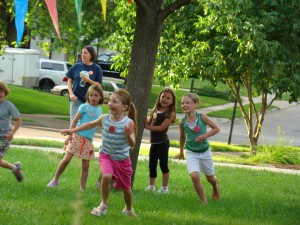Become Your Child’s Friendship Coach
Social skills are foundational to the human experience. They bring us into relationship with others. They give us the opportunity to experience community as well as the joy of intimacy. They enable us to communicate our needs and clarify our desires. They empower us to work together and accomplish greater things. They help us develop friendships. In  other words, social skills serve as a foundation to our relationships, our values, and our growth. Let that foundation weaken and the whole house starts to crumble. I mean, the whole house starts to crumble. In fact, poor social skills contribute to poorer mental and physical health (the whole house). One researcher actually notes that poor social skills increase loneliness and chronic loneliness is “as serious of a risk [factor] as smoking, obesity, or eating a high-fat diet with lack of exercise (Read Poor Social Skills May be Harmful to Your Health for more). In brief, our children fair better physically and mentally when they have good social skills. Fortunately, social skills are learned over time and that learning begins in the family. Parents are their children’s first and most significant social skills coach, their friendship coach. How can a parent become a great friendship coach to their children? Here are 6 tips to help you get started.
other words, social skills serve as a foundation to our relationships, our values, and our growth. Let that foundation weaken and the whole house starts to crumble. I mean, the whole house starts to crumble. In fact, poor social skills contribute to poorer mental and physical health (the whole house). One researcher actually notes that poor social skills increase loneliness and chronic loneliness is “as serious of a risk [factor] as smoking, obesity, or eating a high-fat diet with lack of exercise (Read Poor Social Skills May be Harmful to Your Health for more). In brief, our children fair better physically and mentally when they have good social skills. Fortunately, social skills are learned over time and that learning begins in the family. Parents are their children’s first and most significant social skills coach, their friendship coach. How can a parent become a great friendship coach to their children? Here are 6 tips to help you get started.
- Enjoy time with your children. One of the best ways to coach social skills is by modeling and practicing them yourself. Interact with your children and practice good social skills in the process. Treat them politely. Show them how friends treat one another. Share. Laugh. Play. Set boundaries. Express emotions. Negotiate disagreements. There is no better coach than one who can play the game well and engages his trainees in the process. Enjoy time with your children. (I love the time of Enjoying Your Child–Priceless!)
- Talk about thoughts and feelings with your children. When you watch a movie, talk about the subtext of thoughts and feelings that motivate a character’s actions. When a friend interacts with your children in a way they don’t understand, talk about the subtext of thoughts or feelings that may contribute to that interaction. Explain how your own thoughts and feelings contribute to your actions. Label feelings you and your children experience. The broader a child’s emotional vocabulary, the more understanding they become…the better friend they become. (More tips @ Teaching Your Child to Handle Emotions)
- Allow for individual style. Not everyone is an extravert. Not everyone jumps into social settings. Some people are more introverted. Some slowly warm up to activities and interactions. Allow for those differences in style. Let the introvert enjoy interacting with small groups and the extrovert enjoy the loud social settings. Allow time for your children to slowly warm up to an activity if that is what they need. Allow your children to move quickly into an activity if they are comfortable doing so. Allow for those individual styles and don’t force your children into a style that does not fit their personality. (Read Honoring Variety)
- Create opportunities for social interactions. When your children are young you do this by scheduling play dates. As your children get older, they can become involved in various groups like scouting, church youth groups, choirs, musical groups, sports’ teams, or volunteer groups. You might also consider family games nights with various board games that encourage social interactions. Invite other families over for game night. Play a few games together then let the children go off to play together while the adults chat for a time.
- Turn off the technology and “go face-to-face.” Technology has a way of limiting social skills. Twitter does not allow children to learn the art of reading facial cues or hearing voice tones. Facebook does not let us see the ups & downs of life since people tend to post the happy days. “Face-to-face” interactions, on the other hand, teach us to understand facial expressions and interpret voice cues. They help us learn how and when to ask for clarifications that can deepen our understanding of one another. With this in mind, limit technology. Encourage face-to-face interactions. (More @ Welcome to the Dead Zone for more)
- Give your children space. It may sound contradictory to give our children space, but they need time to practice the skills they are learning without our intervention. They need the opportunities to resolve conflicts, negotiate difference, and enjoy age expected interactions with peers. After all, practice makes perfect. So, take a breath, step back, and let them go. Give them space to practice on their own. (Good Parents Do Nothing!! tells more)
Well “Coach,” follow these tips and you are well on your way to “Coach of the Year.” And your children will develop the social skills necessary to navigate their world independently and successfully!
-0 Comment-